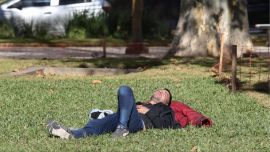Uruguayan President Luis Lacalle Pou delivered forceful remarks at the CELAC summit on Tuesday, criticising members of the regional grouping that he said “do not respect democracy or human rights.”
The centre-right leader, 49, used his speech to the forum to slam the “ideological” nature of the Community of Latin American and Caribbean States (CELAC) meeting and call for the creation of a new regional free-trade zone.
Voicing his discontent at the presence of officials from Cuba, Nicaragua and Venezuela, Lacalle Pou decried the fact that the CELAC summit’s declaration "speaks of respect for democracy, human rights and care for institutions,” but “there are clearly countries here … that do no respect institutions, democracy or human rights.”
Lacalle Pou called on his fellow member states in the 33-country bloc to stop talking and take “action” on trade.
"Isn't it time to be sincere with relations and for CELAC to promote a free-trade zone ... from Mexico to the south of South America? Can we not move in this direction?” he asked.
"We have the possibility to trade freely. Many of our economies are complementary, and I am sure we could make progress," Lacalle Pou said.
The remarks come with Uruguay under pressure from its fellow Mercosur member states. Lacalle Pou is pushing for a trade deal with China without the approval of its partners Argentina, Brazil and Paraguay, a move that the trio says is against the bloc’s rules.
Lacalle Pou, one of the few centre-right leaders at the summit, went on to acknowledge the importance of regional integration and condemn the assault on Brasilia earlier this month by a group of pro-Jair Bolsonaro supporters.
"I have heard speeches that I agree with completely, others that I agree with half of them, and others that I agree with almost nothing. But I understand that our nations have to be linked," he said.
Earlier on, President Alberto Fernández had indicated his backing for the three nations and their leaders, slamming the “blockades” enforced by the United States and other countries, saying they hit “peoples, not governments.”
However, the Peronist leader then raised eyebrows by observing that “all those who are here have been elected by their peoples” – a comment later criticised by domestic opposition leaders who pointed to disputed elections in Nicaragua and Venezuela, as well as the Communist government in Cuba.
– TIMES/NA
























Comments